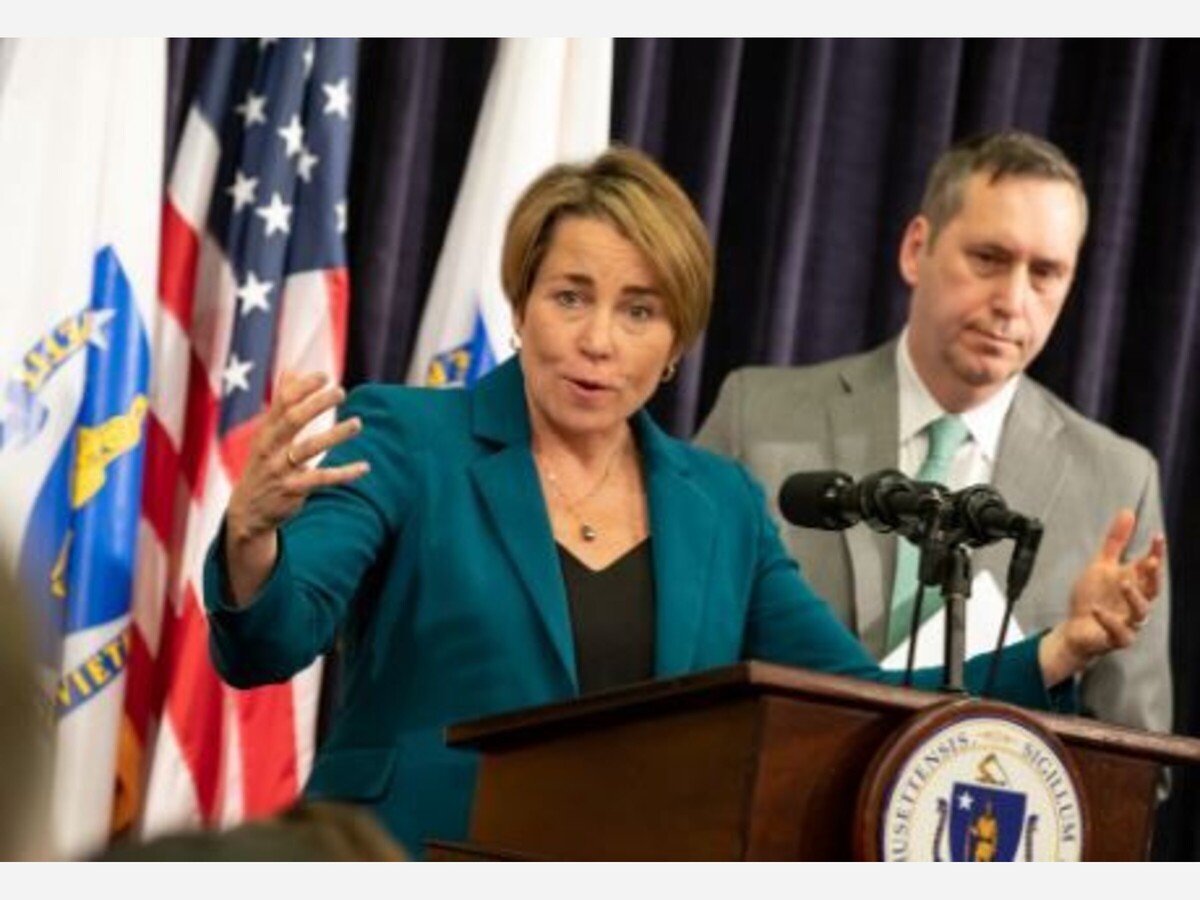Image

Gov. Maura Healey talks through details of her fiscal 2024 budget proposal at a State House news conference Wednesday, which included her budget chief Secretary Matthew Gorzkowicz (right). [Sam Doran/SHNS]
The first state budget from Gov. Maura Healey is a $55.5 billion package that her administration described as a "downpayment" on its goals of making Massachusetts a more affordable place to live, driving the state's decarbonization push and addressing the impacts of climate change, and preparing students for careers in an evolving economy.
The governor said Wednesday that her budget (H 1) combines with the tax relief and reform plan she unveiled Monday and separate legislation to create a standalone housing secretariat to form "one package" to "build a strong economy, to create livable communities, and to put Massachusetts on the path towards a sustainable future."
"We want to make the life of every Massachusetts resident better and more affordable," Healey said.
The bottom line for fiscal year 2024 budget spending represents a 4.1 percent increase over the current year's budget as originally adopted last summer, exactly the growth rate that the administration and lawmakers expect to see from state revenues in fiscal 2024 when accounting for $1 billion from the state's new income surtax.
After watching state revenues surge nearly 40 percent over the last two fiscal years, accommodating a nearly 11 percent increase in spending in the current budget, the administration and Legislature are preparing for a "slowcession" over the next year and a half -- not a downturn from the elevated revenue levels, but a definite handbrake on the eye-popping increases of recent years.
"Public revenue does little good when people can't pay the rent, buy a house, heat their homes or hire child care," Healey said. "Our budget will change that and more."
The proposed spending increases drew praise from a chorus of advocacy groups, along with complaints that more is needed, and a 'less is more' rejoinder from taxpayer watchdog, Massachusetts Fiscal Alliance.
Gov. Healey’s budget will cost taxpayers approximately $55.5 billion dollars, which is almost 14% higher than the previous Governor’s proposed budget in 2022 which came in at $48.5 billion, according to the group. "It's worth noting, at the end of January, the Massachusetts Department of Revenue announced for the first time in many years, the state had a 5% shortfall of tax collections compared to the previous January. The narrow passage of Question 1 raised the state income tax on many small businesses, retirees, home sales, and high income earners by 80 percent. Massachusetts has lost over 100,000 residents since the beginning of the pandemic and the top two destinations have been New Hampshire and Florida."
The Mass Fiscal statement continued, "These very serious economic warnings signs weren’t clear enough for the Healey administration to act on through the Governor’s budget proposal. The budget does not rein in state spending, as more and more state workers are earning hundreds of thousands of dollars without any accountability of payroll expenses, but actually adds more government bureaucracy to the state payroll. As previously reported, Massport saw a massive increase in payroll salaries, with a 30% jump year-over-year in those earning $100,000 or more. According to The Boston Herald, the top two Massport executives, CEO Lisa Wieland and Director of Aviation Edward Freni, now make $417,609 and $413,678, respectively. Unsupervised state payroll spending isn’t just occurring at Massport, as reported, many state workers have used the overtime system to rake in hundreds of thousands of dollars."
“Hang onto your wallets, Governor Maura Healey’s budget will cost you! A $55.5 billion dollar proposed budget, which is 14% higher than the former Governor’s budget proposed last year. If Question 1 didn’t scare away the taxpayers, a 14% increase to state spending certainly will,” stated Paul D. Craney, a spokesman for Mass Fiscal.
“This past January, the state collected 5% less in tax revenue than the same month in the previous year. This happened after Question 1 was implemented, raising the income tax by 80% on some small businesses, retirees, home sales, and high-income earners. It takes a great deal of ignorance to gloss over this fact and propose a state budget that is 14% higher than the last budget proposed. If tax collections continue to fall, how do we continue to spend more? The Governor’s budget simply ignores this unfortunate reality and is setting the taxpayers of the Commonwealth for future tax hikes and new taxes,” continued Craney.
Clearly, there will be contentious months ahead, not only between the Administration and its more conservative critics but between the Administration and the legislators who will be shaping the budget from here.